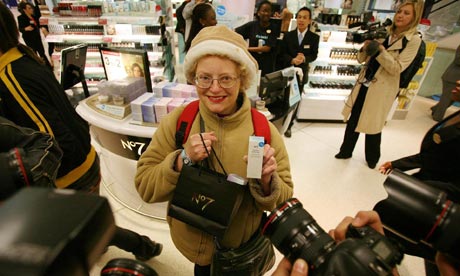
At the time, it probably all seemed like media hype.
When a documentary declared that a Boots anti-ageing cream actually worked, stocks of the serum vanished faster than frown lines, with a whole year's supply of the lotion disappearing from the shelves within a fortnight. But the frenzy surrounding the "No7 Protect and Perfect" range may not have been so half-baked after all.
The results of what is thought to be the first reliable clinical trial of any anti-wrinkle cream available on the high street suggest that it really does help to reduce wrinkles.
In what may spark a second wave of hysteria over the product, scientists at Manchester University concluded that around a fifth of people who used the cream for six months saw some improvement in their skin.
The trial, which compared Boots "No.7 Protect and Perfect intense beauty serum" with a moisturiser, was welcomed by scientists who said it "raised the bar" on the kinds of tests cosmetic companies should do before making claims for their products.
An independent investigation by the BBC's Horizon programme last year caused a run on a product from the same range of creams after it was found to be the only one tested to have any beneficial effect.
"Very few over-the-counter cosmetic 'anti-ageing' products have been subjected to a rigorous, scientific trial to prove their effectiveness," said Chris Griffiths, a dermatologist and leader of the new study.
Prescription drugs known as retinoids have been proved to repair skin that has been aged by sun exposure, but there is scant evidence that the plethora of cosmetic anti-ageing products have a similar effect, Griffiths added.
In the study, 49 women and 11 men aged between 45 and 80 used either the anti-wrinkle product or a placebo moisturising cream for six months. At the end of the period, 43% of those who used the anti-wrinkle cream saw an improvement in the condition of their skin, compared with 22% of those who used the placebo cream.
Tests on the volunteers' skin showed that those who used the anti-ageing cream were producing a protein called fibrillin-1, which makes skin more elastic. The research appears in the British Journal of Dermatology.
Richard Weller, a dermatologist at Edinburgh University, said the study was the first proper trial of an over-the-counter cosmetic product. He said the report was unclear about how much the cream reduced people's wrinkles and it was unlikely to be as effective as retinoids, which can only be prescribed through a GP.
But the trial suggests that other anti-ageing products might also be effective in reducing wrinkles.
"The ingredients in Protect and Perfect are available to other cosmetic companies, and many of them are used in other brands of cosmetics. It would not surprise me if other cosmetics showed similar effects, but it is up to rival cosmetic companies to show this," Weller said. "Most importantly, I think this will raise the bar for what we should expect from the cosmetic companies in showing that their products work."
Nina Goad, a spokeswoman for the British Association of Dermatologists, said: "Approximately one in five people using the cream will get something extra for their money over plain moisturisers. It is an interesting step forward in research, although the long-term benefits are unknown. The main preventable causes of skin ageing are sun exposure and smoking, so if you're worried about wrinkles, limiting these factors is sensible."

